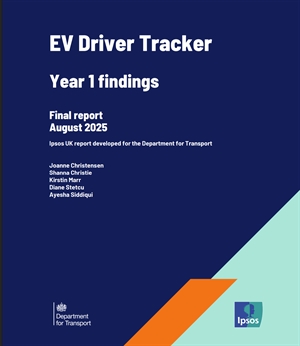New report for DfT finds that most EV drivers are satisfied with their vehicles
Fri 26 September 2025
View all news

A new report by Ipsos for the Department for Transport examines the attitudes and behaviours of battery electric vehicle (BEV) and plug-in hybrid electric vehicle (PHEV) drivers in the UK. The research aims to inform policy and decision-making by improving understanding of EV driving patterns, exploring charging behaviours and experiences, identifying barriers and enables to EV usage and providing evidence of the impact of recent changes in public chargepoint regulations.
The study found that a large majority (78%) of EV drivers intend to get another EV for their next vehicle while less than 6% were unlikely to recommend an EV, indicating high satisfaction overall.
The online research involved more than 1,000 EV drivers in the UK (70% BEV and 30% PHEV), with a small sample invited to take part in a travel and charging diary which was used to collect detailed and granular information about how EV drivers use and charge their vehicles.
The study found that just over half of UK EV drivers were satisfied with public chargepoint availability in their local area (52%) with slightly more satisfied with availability at motorway service areas (56%), but fewer (50%) with A-road service area provision. A significant majority of EV drivers felt confident taking long journeys (58%) and thought public chargepoints were easy to locate (58%).
Around 40% of EV drivers studied acquired their current vehicle through a salary sacrifice scheme (40% BEV, 43% PHEV) and that for those who drove more than one vehicle, the majority (74%) used it as their primary vehicle due to a mix of factors; lower running costs, environmental impact and the driving experience being the most cited reasons.
The research found that a majority of BEV and PHEV drivers had access to off-street parking (91% and 88% respectively), primarily in the form of a private driveway or garage next to their house (85% for both). The challenges for drivers without off-street parking - as well as the higher cost of public, compared with at-home, charging - are increasingly considered a significant barrier to EV uptake.
Most of the BEV drivers had a dedicated home charger installed (76%) compared to PHEV drivers (53%). Among BEV drivers, rural residents (98%) and those living in the Midlands (97%) were more likely to have access to off-street parking compared to urban residents (89%) and those in the south (86%).
The report provides very detailed information about EV driving patterns, common journey purposes and the frequency and purpose of journeys carried out by BEV and PHEV drivers. It found that around half of EV drivers made long distance journeys requiring a charging stop around once a month, or less. A large minority (30%), however, make charging stops on longer journeys at least weekly.
In terms of charging, the study found that all drivers typically charged at home an average of twice weekly. Surprisingly - considering the significantly lower overnight tariffs available - overnight charging was only slightly more common than daytime charging. Almost half of BEV drivers have a dedicated EV tariff with around a third enjoying the lowest charging costs (0-9p per kWh). For the minority (9%) of BEV drivers who were totally reliant on public charging, the most common locations used were business/organisation car parks (27%), dedicated EV charging hubs (23%), and work/school (19%).
The most common complaints from EV drivers about public chargepoints were: unclear pricing (55%); poor reliability (49%); and insufficient provision in relation to demand (47%).
Related Links
< Back to news list